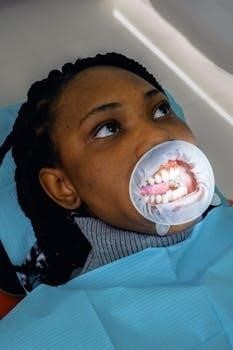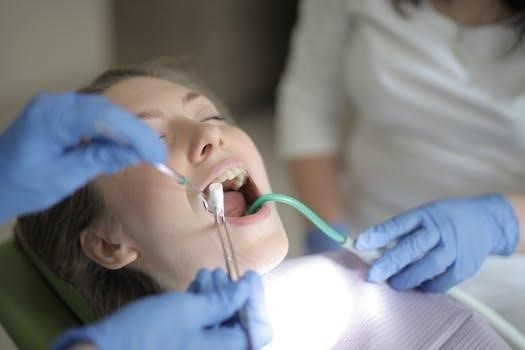Understanding Oral Exams
Oral exams, unlike written ones, focus on verbal communication, similar to a job interview with public speaking. They assess real-time application of knowledge, communication, and critical thinking. These exams evaluate more than just memorization, showcasing your ability to articulate concepts.
What is an Oral Exam?
An oral exam is a verbal assessment where an examiner questions a student to gauge their understanding and proficiency in a subject, often used in language learning to evaluate speaking ability. The exam typically involves guided questions tailored to the student’s level, like A1 or B2. It’s a dynamic interaction, not just a recitation of memorized facts. Think of it as a conversation with an academic purpose. Unlike written exams, oral exams emphasize the real-time application of knowledge and the ability to articulate ideas clearly. It tests not only what you know but how well you can communicate it verbally. Oral exams can vary across subjects but are increasingly used to assess not only knowledge but also communication skills and critical thinking abilities. In many ways, it’s a live performance where you demonstrate mastery of the material.
Purpose of Oral Exams
The primary purpose of oral exams is to assess a student’s knowledge and mastery of a subject, evaluating not just recall but also the ability to apply that knowledge in real-time. Oral exams go beyond testing memorization; they seek to understand how well you can use the material in a dynamic, interactive setting. They also serve as a platform to demonstrate interpersonal communication skills, showcasing your ability to articulate thoughts clearly and concisely. They are designed to gauge your critical thinking abilities, requiring you to analyze and respond to questions effectively. Moreover, oral exams provide an opportunity to demonstrate your understanding of the subject matter with confidence. Essentially, these exams aim to measure your grasp of the content, your ability to think on your feet, and your capacity to communicate your ideas effectively, thus offering a more comprehensive assessment.

Preparation Strategies
Effective preparation involves starting early, mastering the material, and simulating the exam environment. This includes creating a timeline, using study techniques like mind maps, and practicing with mock exams to build confidence.
Early Preparation and Timeline
The journey to a successful oral exam begins well in advance, ideally weeks or even months before the scheduled date. Begin by understanding the exam format, including the types of questions that might be asked and the specific criteria used for evaluation. This foundational understanding will guide your subsequent preparation efforts. Next, create a detailed study timeline. This timeline should break down your revision process into manageable, bite-sized tasks. Avoid the temptation to cram all the material into a single session; instead, allocate specific time slots for different topics or concepts. Remember, consistent, focused effort over time is far more effective than last-minute panic. Consider using a calendar or planning app to track your progress and ensure you stay on schedule. Regular review and practice are key.
Mastering the Material
Moving beyond a simple understanding of the material, the key to success lies in truly mastering it. This means going deeper than just memorizing facts and figures; instead, strive to grasp the underlying concepts, historical debates, and key scholars related to your subject. Engage with the material actively. Techniques like mind mapping, summarizing key points, and employing teach-back methods can greatly enhance your comprehension and retention. Don’t be afraid to challenge yourself by exploring related topics and perspectives. The more you explore the material, the better equipped you will be to handle complex questions during the oral exam. The goal is to have a solid and nuanced understanding of the subject matter, allowing you to articulate your knowledge clearly and confidently. It’s not about reciting what you’ve memorized, it’s about showing that you truly understand the topic.
Simulating the Exam Environment
To truly prepare for an oral exam, it is critical to simulate the actual exam environment. This practice allows you to become comfortable with the pressure and format of the real situation. Enlist the help of a study buddy, a family member, or even a friend to act as the examiner. Put on your professional attire and set a timer to mimic the exam conditions. Engage in regular practice sessions that include answering questions verbally. This practice will not only help you get accustomed to the process, but it will also help you to refine your answers, reduce exam-related anxieties, and improve your delivery. These mock exams are extremely valuable for boosting your confidence and preparedness for the actual exam. The goal is to make the real exam seem like another practice session.

Exam Day Tips
On exam day, dress professionally to boost confidence, and practice calming techniques like deep breathing. If faced with a difficult question, take a moment to think. Remember clarity, conciseness, and relevance when answering.
Dressing Professionally
Choosing the right attire for your oral exam is crucial, as it can significantly impact your confidence and how you’re perceived by the examiners. While it may seem like a minor detail, dressing professionally demonstrates respect for the process and can help you feel more composed and in control. Think of it as dressing for a future job interview; you want to present yourself as someone who takes the situation seriously and is prepared to engage in a formal setting. Opt for clothing that is comfortable yet polished. Avoid anything too casual or distracting. A smart, well-fitting outfit can boost your self-assurance, which can, in turn, positively influence your performance during the exam. Remember, first impressions matter, and your attire is part of that initial communication. It is about presenting a professional image that complements your academic preparation. Your goal is to look organized, put-together, and ready to succeed, showing that you are taking the exam seriously.
Calming Techniques
Managing anxiety before an oral exam is crucial for optimal performance. One of the most effective techniques is controlled breathing. Taking slow, deep breaths can help calm your nerves and reduce stress. Consider using a meditation app for guided breathing exercises before the exam. Good preparation also plays a significant role in calming your nerves; the more prepared you are, the more confident you’ll feel. Practice answering questions aloud, either alone or with a partner. Ask your teacher for tips and guidance. Remember that an oral exam is just a way to show what you know and isn’t the end of the world. It’s beneficial to take a moment to collect your thoughts before answering a question; it’s acceptable to pause and think. Focus on your clarity and relevance. Prioritize getting enough sleep, eating well, staying hydrated, and avoiding caffeine before the exam. These physical preparations can do wonders to help keep you feeling calm and focused.
Answering Questions Effectively
Answering questions effectively during an oral exam requires a strategic approach. First, listen attentively to the question to fully understand what’s being asked. If needed, don’t hesitate to ask for clarification. When you answer, structure your response clearly and concisely. Start with a direct answer, then provide supporting evidence or examples. If you need a moment to gather your thoughts, it’s acceptable to pause briefly. It’s beneficial to avoid rambling or going off-topic; focus on the key points of the question. Practice formulating answers out loud, which helps articulate your thoughts. If you have anecdotes or relevant stories that relate to the question, incorporate those into your responses. Always maintain eye contact and speak clearly and confidently. Remember that an oral exam is also a form of communication and conversation, not a one-sided test. Stay positive, confident, and remember that you can influence the flow of the exam through your approach.

Post-Exam Reflection
After your oral exam, take time to review your performance. Identify what went well and areas for improvement. This reflection is valuable for future oral exams and helps with overall academic growth. Note what you would do differently next time.
Reviewing Performance
After completing your oral exam, it’s crucial to dedicate time to a thorough review of your performance. This isn’t about dwelling on mistakes, but rather about extracting valuable lessons for future growth. Start by considering the questions you answered confidently and those that posed a challenge. What strategies did you use effectively, and where could you have improved? Did you understand all the questions, and if not, what specific areas do you need to study more? Reflect on your delivery⁚ were you clear, concise, and engaging? Consider your body language and posture; did they project confidence? Did you maintain a good pace throughout the exam, or did you rush or hesitate too much? Did you listen attentively to the questions asked, and did you fully address them? This reflection will be invaluable for your continuous learning and development. Also, remember to give yourself credit where credit is due!

Additional Tips
Active class participation, homework, and regular practice are crucial. Cue cards with key phrases aid recall. Posture impacts confidence. Early preparation and mock exams help significantly. Remember to breathe and structure your responses to ensure clarity.
Importance of Active Participation
Active participation is a cornerstone of oral exam success, extending far beyond simply attending classes. It involves engaging deeply with the material, asking questions, and contributing to discussions. This proactive approach not only solidifies your understanding but also cultivates your ability to articulate your thoughts clearly. By actively participating, you’re essentially practicing for the oral exam throughout the semester. It helps you identify areas where you might need more clarification and provides opportunities to test your understanding in real-time. Furthermore, active engagement fosters a deeper connection with the subject matter, making it easier to recall information when needed. It also demonstrates to your instructors your commitment to learning. This active involvement allows you to refine your communication skills, ensuring you can confidently present your knowledge during the exam.
Using Cue Cards
Cue cards can be an invaluable tool for oral exam preparation, serving as a memory aid without relying on rote memorization. These cards should not contain full sentences, but rather keywords, key phrases, or important vocabulary that serve as prompts for your answers. The act of creating cue cards itself helps reinforce your learning as you actively decide what information is most crucial. During the exam, use these cards sparingly, glancing at them only when you need a nudge. Avoid reading directly from the cards, as this can disrupt the flow of your speech and make you seem unprepared. Instead, allow the keywords to trigger your knowledge, enabling you to speak more naturally and confidently. Keep the cards concise and well-organized for quick access, and remember they are a tool to support your understanding, not a crutch.
The Role of Posture
Posture in an oral exam setting is a subtle yet significant form of nonverbal communication that can greatly influence how your message is perceived. Maintaining an upright and open posture projects confidence and engagement, suggesting that you are comfortable with the material and ready to discuss it. Conversely, slouching or hunching can convey nervousness or a lack of interest, even if your verbal responses are strong. It’s important to be aware of your body language, ensuring that it reinforces the confidence and knowledge you possess. Sit with your shoulders relaxed, your back straight, and make eye contact with your examiner. This intentional posture shows respect and attentiveness, and helps you feel more grounded and in control. While it might seem like a minor detail, your posture contributes to the overall impression you make during the exam.
